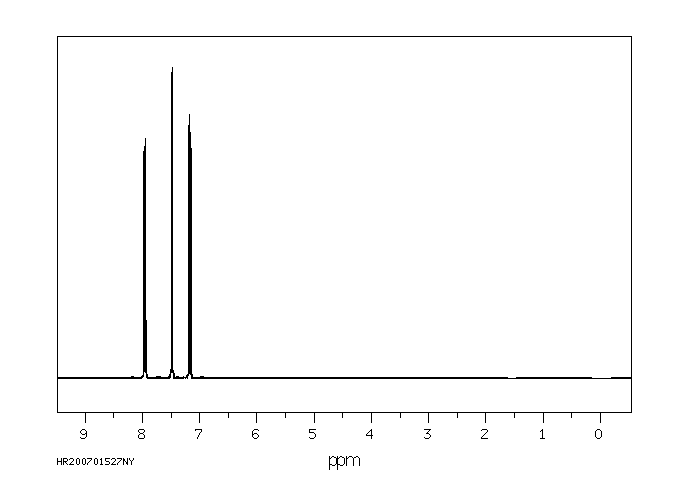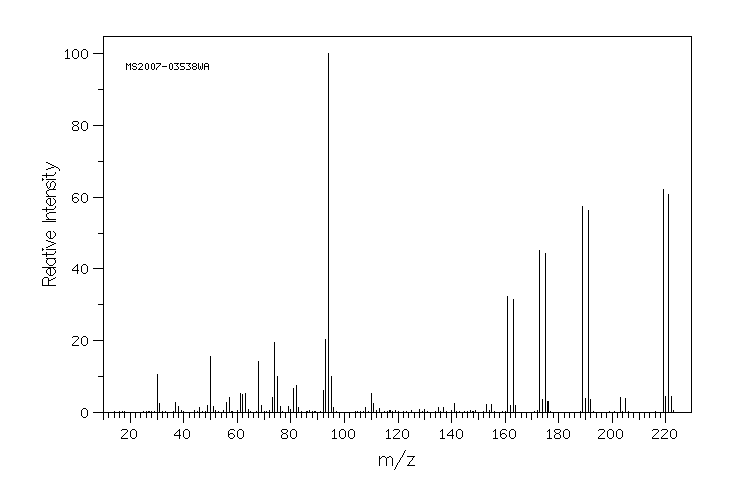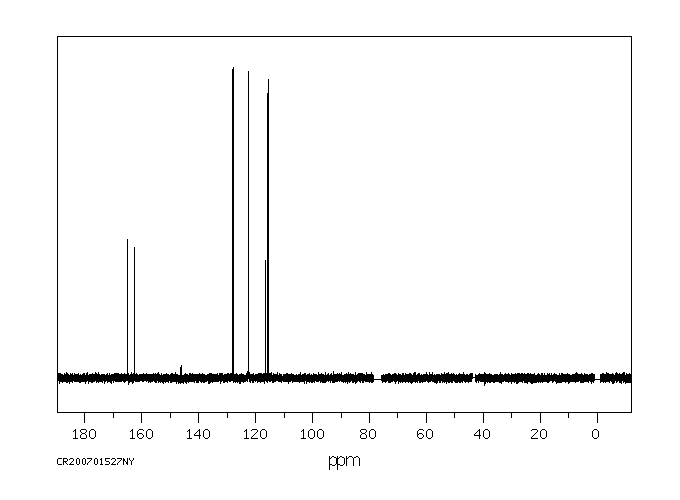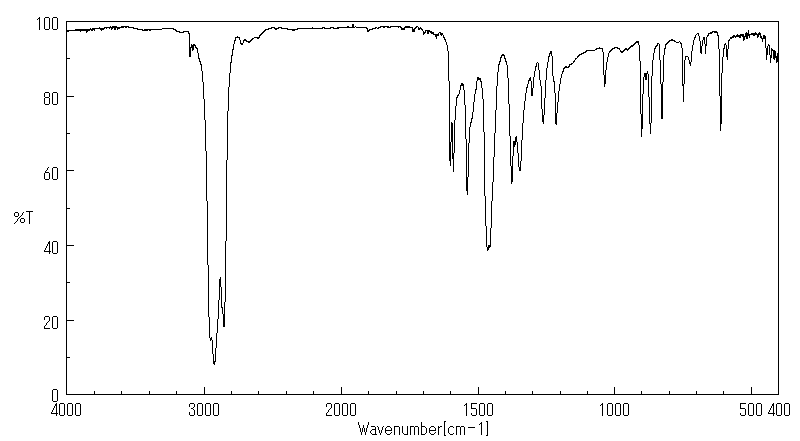2-溴-4-氟-1-硝基苯 | 700-36-7
中文名称
2-溴-4-氟-1-硝基苯
中文别名
4-氟-2-溴硝基苯;2-溴-4-氟硝基苯;1-溴-5-氟-2-硝基苯;1-溴-2-硝基-5-氟苯
英文名称
2-bromo-4-fluoronitrobenzene
英文别名
2-bromo-4-fluoro-1-nitrobenzene;1-bromo-5-fluoro-2-nitrobenzene
CAS
700-36-7
化学式
C6H3BrFNO2
mdl
——
分子量
219.998
InChiKey
VGYVBEJDXIPSDL-UHFFFAOYSA-N
BEILSTEIN
——
EINECS
——
-
物化性质
-
计算性质
-
ADMET
-
安全信息
-
SDS
-
制备方法与用途
-
上下游信息
-
文献信息
-
表征谱图
-
同类化合物
-
相关功能分类
-
相关结构分类
物化性质
-
熔点:44 °C
-
沸点:70-75 °C(Press: 0.4 Torr)
-
密度:1.808±0.06 g/cm3(Predicted)
-
溶解度:溶于甲醇
计算性质
-
辛醇/水分配系数(LogP):2.4
-
重原子数:11
-
可旋转键数:0
-
环数:1.0
-
sp3杂化的碳原子比例:0.0
-
拓扑面积:45.8
-
氢给体数:0
-
氢受体数:3
安全信息
-
安全说明:S24/25
-
海关编码:2904909090
-
危险性防范说明:P261,P305+P351+P338
-
危险性描述:H302,H315,H319,H335
-
储存条件:室温
SDS
2-溴-4-氟-1-硝基苯 修改号码:5
模块 1. 化学品
产品名称: 2-Bromo-4-fluoro-1-nitrobenzene
修改号码: 5
模块 2. 危险性概述
GHS分类
物理性危害 未分类
健康危害
皮肤腐蚀/刺激 第2级
严重损伤/刺激眼睛 2A类
环境危害 未分类
GHS标签元素
图标或危害标志
信号词 警告
危险描述 造成皮肤刺激
造成严重眼刺激
防范说明
[预防] 处理后要彻底清洗双手。
穿戴防护手套/护目镜/防护面具。
[急救措施] 眼睛接触:用水小心清洗几分钟。如果方便,易操作,摘除隐形眼镜。继续冲洗。
眼睛接触:求医/就诊
皮肤接触:用大量肥皂和水轻轻洗。
若皮肤刺激:求医/就诊。
脱掉被污染的衣物,清洗后方可重新使用。
模块 3. 成分/组成信息
单一物质/混和物 单一物质
化学名(中文名): 2-溴-4-氟-1-硝基苯
百分比: >98.0%(GC)
CAS编码: 700-36-7
分子式: C6H3BrFNO2
2-溴-4-氟-1-硝基苯 修改号码:5
模块 4. 急救措施
吸入: 将受害者移到新鲜空气处,保持呼吸通畅,休息。若感不适请求医/就诊。
皮肤接触: 立即去除/脱掉所有被污染的衣物。用大量肥皂和水轻轻洗。
若皮肤刺激或发生皮疹:求医/就诊。
眼睛接触: 用水小心清洗几分钟。如果方便,易操作,摘除隐形眼镜。继续清洗。
如果眼睛刺激:求医/就诊。
食入: 若感不适,求医/就诊。漱口。
紧急救助者的防护: 救援者需要穿戴个人防护用品,比如橡胶手套和气密性护目镜。
模块 5. 消防措施
合适的灭火剂: 干粉,泡沫,雾状水,二氧化碳
特殊危险性: 小心,燃烧或高温下可能分解产生毒烟。
特定方法: 从上风处灭火,根据周围环境选择合适的灭火方法。
非相关人员应该撤离至安全地方。
周围一旦着火:如果安全,移去可移动容器。
消防员的特殊防护用具: 灭火时,一定要穿戴个人防护用品。
模块 6. 泄漏应急处理
个人防护措施,防护用具, 使用个人防护用品。远离溢出物/泄露处并处在上风处。
紧急措施: 泄露区应该用安全带等圈起来,控制非相关人员进入。
环保措施: 防止进入下水道。
控制和清洗的方法和材料: 清扫收集粉尘,封入密闭容器。注意切勿分散。附着物或收集物应该立即根据合适的
法律法规处置。
模块 7. 操作处置与储存
处理
技术措施: 在通风良好处进行处理。穿戴合适的防护用具。防止粉尘扩散。处理后彻底清洗双手
和脸。
注意事项: 如果粉尘或浮质产生,使用局部排气。
操作处置注意事项: 避免接触皮肤、眼睛和衣物。
贮存
储存条件: 保持容器密闭。存放于凉爽、阴暗处。
远离不相容的材料比如氧化剂存放。
包装材料: 依据法律。
模块 8. 接触控制和个体防护
工程控制: 尽可能安装封闭体系或局部排风系统,操作人员切勿直接接触。同时安装淋浴器和洗
眼器。
个人防护用品
呼吸系统防护: 防尘面具。依据当地和政府法规。
手部防护: 防护手套。
眼睛防护: 安全防护镜。如果情况需要,佩戴面具。
皮肤和身体防护: 防护服。如果情况需要,穿戴防护靴。
模块 9. 理化特性
固体
外形(20°C):
外观: 晶体-粉末
颜色: 微浅黄色-浅黄绿色
气味: 无资料
2-溴-4-氟-1-硝基苯 修改号码:5
模块 9. 理化特性
pH: 无数据资料
熔点:
44°C
沸点/沸程 无资料
闪点: 无资料
爆炸特性
爆炸下限: 无资料
爆炸上限: 无资料
密度: 无资料
溶解度:
[水] 无资料
[其他溶剂]
溶于: 甲醇
模块 10. 稳定性和反应性
化学稳定性: 一般情况下稳定。
危险反应的可能性: 未报道特殊反应性。
须避免接触的物质 氧化剂
危险的分解产物: 一氧化碳, 二氧化碳, 氮氧化物 (NOx), 氟化氢, 溴化氢
模块 11. 毒理学信息
急性毒性: 无资料
对皮肤腐蚀或刺激: 无资料
对眼睛严重损害或刺激: 无资料
生殖细胞变异原性: 无资料
致癌性:
IARC = 无资料
NTP = 无资料
生殖毒性: 无资料
模块 12. 生态学信息
生态毒性:
鱼类: 无资料
甲壳类: 无资料
藻类: 无资料
残留性 / 降解性: 无资料
潜在生物累积 (BCF): 无资料
土壤中移动性
log水分配系数: 无资料
土壤吸收系数 (Koc): 无资料
亨利定律 无资料
constaNT(PaM3/mol):
模块 13. 废弃处置
如果可能,回收处理。请咨询当地管理部门。建议在可燃溶剂中溶解混合,在装有后燃和洗涤装置的化学焚烧炉中
焚烧。废弃处置时请遵守国家、地区和当地的所有法规。
模块 14. 运输信息
联合国分类: 与联合国分类标准不一致
UN编号: 未列明
2-溴-4-氟-1-硝基苯 修改号码:5
模块 15. 法规信息
《危险化学品安全管理条例》(2002年1月26日国务院发布,2011年2月16日修订): 针对危险化学品的安全使用、
生产、储存、运输、装卸等方面均作了相应的规定。
模块16 - 其他信息
N/A
模块 1. 化学品
产品名称: 2-Bromo-4-fluoro-1-nitrobenzene
修改号码: 5
模块 2. 危险性概述
GHS分类
物理性危害 未分类
健康危害
皮肤腐蚀/刺激 第2级
严重损伤/刺激眼睛 2A类
环境危害 未分类
GHS标签元素
图标或危害标志
信号词 警告
危险描述 造成皮肤刺激
造成严重眼刺激
防范说明
[预防] 处理后要彻底清洗双手。
穿戴防护手套/护目镜/防护面具。
[急救措施] 眼睛接触:用水小心清洗几分钟。如果方便,易操作,摘除隐形眼镜。继续冲洗。
眼睛接触:求医/就诊
皮肤接触:用大量肥皂和水轻轻洗。
若皮肤刺激:求医/就诊。
脱掉被污染的衣物,清洗后方可重新使用。
模块 3. 成分/组成信息
单一物质/混和物 单一物质
化学名(中文名): 2-溴-4-氟-1-硝基苯
百分比: >98.0%(GC)
CAS编码: 700-36-7
分子式: C6H3BrFNO2
2-溴-4-氟-1-硝基苯 修改号码:5
模块 4. 急救措施
吸入: 将受害者移到新鲜空气处,保持呼吸通畅,休息。若感不适请求医/就诊。
皮肤接触: 立即去除/脱掉所有被污染的衣物。用大量肥皂和水轻轻洗。
若皮肤刺激或发生皮疹:求医/就诊。
眼睛接触: 用水小心清洗几分钟。如果方便,易操作,摘除隐形眼镜。继续清洗。
如果眼睛刺激:求医/就诊。
食入: 若感不适,求医/就诊。漱口。
紧急救助者的防护: 救援者需要穿戴个人防护用品,比如橡胶手套和气密性护目镜。
模块 5. 消防措施
合适的灭火剂: 干粉,泡沫,雾状水,二氧化碳
特殊危险性: 小心,燃烧或高温下可能分解产生毒烟。
特定方法: 从上风处灭火,根据周围环境选择合适的灭火方法。
非相关人员应该撤离至安全地方。
周围一旦着火:如果安全,移去可移动容器。
消防员的特殊防护用具: 灭火时,一定要穿戴个人防护用品。
模块 6. 泄漏应急处理
个人防护措施,防护用具, 使用个人防护用品。远离溢出物/泄露处并处在上风处。
紧急措施: 泄露区应该用安全带等圈起来,控制非相关人员进入。
环保措施: 防止进入下水道。
控制和清洗的方法和材料: 清扫收集粉尘,封入密闭容器。注意切勿分散。附着物或收集物应该立即根据合适的
法律法规处置。
模块 7. 操作处置与储存
处理
技术措施: 在通风良好处进行处理。穿戴合适的防护用具。防止粉尘扩散。处理后彻底清洗双手
和脸。
注意事项: 如果粉尘或浮质产生,使用局部排气。
操作处置注意事项: 避免接触皮肤、眼睛和衣物。
贮存
储存条件: 保持容器密闭。存放于凉爽、阴暗处。
远离不相容的材料比如氧化剂存放。
包装材料: 依据法律。
模块 8. 接触控制和个体防护
工程控制: 尽可能安装封闭体系或局部排风系统,操作人员切勿直接接触。同时安装淋浴器和洗
眼器。
个人防护用品
呼吸系统防护: 防尘面具。依据当地和政府法规。
手部防护: 防护手套。
眼睛防护: 安全防护镜。如果情况需要,佩戴面具。
皮肤和身体防护: 防护服。如果情况需要,穿戴防护靴。
模块 9. 理化特性
固体
外形(20°C):
外观: 晶体-粉末
颜色: 微浅黄色-浅黄绿色
气味: 无资料
2-溴-4-氟-1-硝基苯 修改号码:5
模块 9. 理化特性
pH: 无数据资料
熔点:
44°C
沸点/沸程 无资料
闪点: 无资料
爆炸特性
爆炸下限: 无资料
爆炸上限: 无资料
密度: 无资料
溶解度:
[水] 无资料
[其他溶剂]
溶于: 甲醇
模块 10. 稳定性和反应性
化学稳定性: 一般情况下稳定。
危险反应的可能性: 未报道特殊反应性。
须避免接触的物质 氧化剂
危险的分解产物: 一氧化碳, 二氧化碳, 氮氧化物 (NOx), 氟化氢, 溴化氢
模块 11. 毒理学信息
急性毒性: 无资料
对皮肤腐蚀或刺激: 无资料
对眼睛严重损害或刺激: 无资料
生殖细胞变异原性: 无资料
致癌性:
IARC = 无资料
NTP = 无资料
生殖毒性: 无资料
模块 12. 生态学信息
生态毒性:
鱼类: 无资料
甲壳类: 无资料
藻类: 无资料
残留性 / 降解性: 无资料
潜在生物累积 (BCF): 无资料
土壤中移动性
log水分配系数: 无资料
土壤吸收系数 (Koc): 无资料
亨利定律 无资料
constaNT(PaM3/mol):
模块 13. 废弃处置
如果可能,回收处理。请咨询当地管理部门。建议在可燃溶剂中溶解混合,在装有后燃和洗涤装置的化学焚烧炉中
焚烧。废弃处置时请遵守国家、地区和当地的所有法规。
模块 14. 运输信息
联合国分类: 与联合国分类标准不一致
UN编号: 未列明
2-溴-4-氟-1-硝基苯 修改号码:5
模块 15. 法规信息
《危险化学品安全管理条例》(2002年1月26日国务院发布,2011年2月16日修订): 针对危险化学品的安全使用、
生产、储存、运输、装卸等方面均作了相应的规定。
模块16 - 其他信息
N/A
上下游信息
-
上游原料
中文名称 英文名称 CAS号 化学式 分子量 2-溴-4-氟苯胺 2-bromo-4-fluoroaniline 1003-98-1 C6H5BrFN 190.015 -
下游产品
中文名称 英文名称 CAS号 化学式 分子量 3-溴-4,6-二硝基氟苯 1-bromo-3-fluoro-4,6-dinitrobenzene 400-91-9 C6H2BrFN2O4 264.995 2-溴-4-氟苯胺 2-bromo-4-fluoroaniline 1003-98-1 C6H5BrFN 190.015 3-溴-4-硝基苯酚 3-bromo-4-nitrophenol 5470-65-5 C6H4BrNO3 218.007 3-溴-4-硝基苯甲醚 2-bromo-4-methoxy-1-nitrobenzene 98447-30-4 C7H6BrNO3 232.034
反应信息
-
作为反应物:描述:参考文献:名称:New Heteroaromatic Compounds. XVII.1 Fluoro Derivatives of 10-Methyl-10,9-borazarophenanthrene2摘要:DOI:10.1021/jo01042a006
-
作为产物:描述:参考文献:名称:一种3-溴-4-溴硝基苯酚的制备方法摘要:本发明公开了一种3‑溴‑4‑溴硝基苯酚的工业化制备方法。该3‑溴‑4‑溴硝基苯酚的工业化制备方法,以对氟苯胺为初始原料,经上溴、重氮化上硝基以及水解三步反应合成3‑溴‑4‑溴硝基苯酚。本过程得到的3‑溴‑4‑溴硝基苯酚为黄色固体,纯度97.5%,每步原料转化率分别达到100%,整个过程的总收率达到25.8%。公开号:CN109369411A
文献信息
-
[EN] COMPOUNDS INHIBITING LEUCINE-RICH REPEAT KINASE ENZYME ACTIVITY<br/>[FR] COMPOSÉS INHIBANT L'ACTIVITÉ ENZYMATIQUE DE LA KINASE À MOTIFS RÉPÉTÉS RICHES EN LEUCINE申请人:MERCK SHARP & DOHME公开号:WO2014137723A1公开(公告)日:2014-09-12The present invention is directed to indazole compounds which are potent inhibitors of LRRK2 kinase and useful in the treatment or prevention of diseases in which the LRRK2 kinase is involved, such as Parkinson's Disease. The invention is also directed to pharmaceutical compositions comprising these compounds and the use of these compounds and compositions in the prevention or treatment of such diseases in which LRRK-2 kinase is involved.
-
[EN] COMPOUNDS INHIBITING LEUCINE-RICH REPEAT KINASE ENZYME ACTIVITY<br/>[FR] COMPOSÉS INHIBANT L'ACTIVITÉ ENZYMATIQUE DE LA KINASE À SÉQUENCE RÉPÉTÉE RICHE EN LEUCINE申请人:MERCK SHARP & DOHME公开号:WO2014134774A1公开(公告)日:2014-09-12Disclosed are indazole compounds which are potent inhibitors of LRRK2 kinase and useful in the treatment or prevention of diseases in which LRRK2 kinase is involved. Also disclosed are pharmaceutical compositions in the prevention or treatment of such diseases in which LRRK2 kinase is involved.揭示了一种indazole化合物,它们是LRRK2激酶的有效抑制剂,并且在涉及LRRK2激酶的疾病的治疗或预防中有用。还揭示了在涉及LRRK2激酶的这类疾病的预防或治疗中使用的药物组合物。
-
FURTHER SUBSTITUTED TRIAZOLO QUINOXALINE DERIVATIVES申请人:Grünenthal GmbH公开号:US20200024281A1公开(公告)日:2020-01-23The present invention relates to compounds according to general formula (I) which act as modulators of the glucocorticoid receptor and can be used in the treatment and/or prophylaxis of disorders which are at least partially mediated by the glucocorticoid receptor.本发明涉及符合一般式(I)的化合物,这些化合物作为糖皮质激素受体的调节剂,并可用于治疗和/或预防至少部分由糖皮质激素受体介导的疾病。
-
Discovery of a 3-(4-Pyrimidinyl) Indazole (MLi-2), an Orally Available and Selective Leucine-Rich Repeat Kinase 2 (LRRK2) Inhibitor that Reduces Brain Kinase Activity作者:Jack D. Scott、Duane E. DeMong、Thomas J. Greshock、Kallol Basu、Xing Dai、Joel Harris、Alan Hruza、Sarah W. Li、Sue-Ing Lin、Hong Liu、Megan K. Macala、Zhiyong Hu、Hong Mei、Honglu Zhang、Paul Walsh、Marc Poirier、Zhi-Cai Shi、Li Xiao、Gautam Agnihotri、Marco A. S. Baptista、John Columbus、Matthew J. Fell、Lynn A. Hyde、Reshma Kuvelkar、Yinghui Lin、Christian Mirescu、John A. Morrow、Zhizhang Yin、Xiaoping Zhang、Xiaoping Zhou、Ronald K. Chang、Mark W. Embrey、John M. Sanders、Heather E. Tiscia、Robert E. Drolet、Jonathan T. Kern、Sylvie M. Sur、John J. Renger、Mark T. Bilodeau、Matthew E. Kennedy、Eric M. Parker、Andrew W. Stamford、Ravi Nargund、John A. McCauley、Michael W. MillerDOI:10.1021/acs.jmedchem.7b00045日期:2017.4.13set out to develop LRRK2 inhibitors to test this hypothesis. A high throughput screen of our compound collection afforded a number of promising indazole leads which were truncated in order to identify a minimum pharmacophore. Further optimization of these indazoles led to the development of MLi-2 (1): a potent, highly selective, orally available, brain-penetrant inhibitor of LRRK2.
-
[EN] ORGANIC ELECTROLUMINESCENT COMPOUND AND ORGANIC ELECTROLUMINESCENT DEVICE COMPRISING THE SAME<br/>[FR] COMPOSÉ ORGANIQUE ÉLECTROLUMINESCENT ET DISPOSITIF ORGANIQUE ÉLECTROLUMINESCENT LE COMPRENANT申请人:ROHM & HAAS ELECT MAT公开号:WO2015167300A1公开(公告)日:2015-11-05The present disclosure relates to an organic electroluminescent compound of Formula 1 (variables R1 -R10 defined herein), and an organic electroluminescent device comprising the same. By using the organic electroluminescent compound according to the present disclosure, it is possible to produce an organic electroluminescent device which can be operated at a lowered driving voltage, shows excellence in luminous efficiency such as current efficiency and power efficiency, and has high color purity and improved lifespan. [Formula should be entered here]本公开涉及一种具有化学式1(其中定义了变量R1-R10)的有机电致发光化合物,以及包括该化合物的有机电致发光器件。通过使用本公开的有机电致发光化合物,可以制备出可以在较低驱动电压下运行、在发光效率(如电流效率和功率效率)方面表现出色、具有高色纯度和改善寿命的有机电致发光器件。
表征谱图
-
氢谱1HNMR
-
质谱MS
-
碳谱13CNMR
-
红外IR
-
拉曼Raman
-
峰位数据
-
峰位匹配
-
表征信息
同类化合物
(βS)-β-氨基-4-(4-羟基苯氧基)-3,5-二碘苯甲丙醇
(S,S)-邻甲苯基-DIPAMP
(S)-(-)-7'-〔4(S)-(苄基)恶唑-2-基]-7-二(3,5-二-叔丁基苯基)膦基-2,2',3,3'-四氢-1,1-螺二氢茚
(S)-盐酸沙丁胺醇
(S)-3-(叔丁基)-4-(2,6-二甲氧基苯基)-2,3-二氢苯并[d][1,3]氧磷杂环戊二烯
(S)-2,2'-双[双(3,5-三氟甲基苯基)膦基]-4,4',6,6'-四甲氧基联苯
(S)-1-[3,5-双(三氟甲基)苯基]-3-[1-(二甲基氨基)-3-甲基丁烷-2-基]硫脲
(R)富马酸托特罗定
(R)-(-)-盐酸尼古地平
(R)-(-)-4,12-双(二苯基膦基)[2.2]对环芳烷(1,5环辛二烯)铑(I)四氟硼酸盐
(R)-(+)-7-双(3,5-二叔丁基苯基)膦基7''-[((6-甲基吡啶-2-基甲基)氨基]-2,2'',3,3''-四氢-1,1''-螺双茚满
(R)-(+)-7-双(3,5-二叔丁基苯基)膦基7''-[(4-叔丁基吡啶-2-基甲基)氨基]-2,2'',3,3''-四氢-1,1''-螺双茚满
(R)-(+)-7-双(3,5-二叔丁基苯基)膦基7''-[(3-甲基吡啶-2-基甲基)氨基]-2,2'',3,3''-四氢-1,1''-螺双茚满
(R)-(+)-4,7-双(3,5-二-叔丁基苯基)膦基-7“-[(吡啶-2-基甲基)氨基]-2,2”,3,3'-四氢1,1'-螺二茚满
(R)-3-(叔丁基)-4-(2,6-二苯氧基苯基)-2,3-二氢苯并[d][1,3]氧杂磷杂环戊烯
(R)-2-[((二苯基膦基)甲基]吡咯烷
(R)-1-[3,5-双(三氟甲基)苯基]-3-[1-(二甲基氨基)-3-甲基丁烷-2-基]硫脲
(N-(4-甲氧基苯基)-N-甲基-3-(1-哌啶基)丙-2-烯酰胺)
(5-溴-2-羟基苯基)-4-氯苯甲酮
(5-溴-2-氯苯基)(4-羟基苯基)甲酮
(5-氧代-3-苯基-2,5-二氢-1,2,3,4-oxatriazol-3-鎓)
(4S,5R)-4-甲基-5-苯基-1,2,3-氧代噻唑烷-2,2-二氧化物-3-羧酸叔丁酯
(4S,4''S)-2,2''-亚环戊基双[4,5-二氢-4-(苯甲基)恶唑]
(4-溴苯基)-[2-氟-4-[6-[甲基(丙-2-烯基)氨基]己氧基]苯基]甲酮
(4-丁氧基苯甲基)三苯基溴化磷
(3aR,8aR)-(-)-4,4,8,8-四(3,5-二甲基苯基)四氢-2,2-二甲基-6-苯基-1,3-二氧戊环[4,5-e]二恶唑磷
(3aR,6aS)-5-氧代六氢环戊基[c]吡咯-2(1H)-羧酸酯
(2Z)-3-[[(4-氯苯基)氨基]-2-氰基丙烯酸乙酯
(2S,3S,5S)-5-(叔丁氧基甲酰氨基)-2-(N-5-噻唑基-甲氧羰基)氨基-1,6-二苯基-3-羟基己烷
(2S,2''S,3S,3''S)-3,3''-二叔丁基-4,4''-双(2,6-二甲氧基苯基)-2,2'',3,3''-四氢-2,2''-联苯并[d][1,3]氧杂磷杂戊环
(2S)-(-)-2-{[[[[3,5-双(氟代甲基)苯基]氨基]硫代甲基]氨基}-N-(二苯基甲基)-N,3,3-三甲基丁酰胺
(2S)-2-[[[[[((1S,2S)-2-氨基环己基]氨基]硫代甲基]氨基]-N-(二苯甲基)-N,3,3-三甲基丁酰胺
(2S)-2-[[[[[[((1R,2R)-2-氨基环己基]氨基]硫代甲基]氨基]-N-(二苯甲基)-N,3,3-三甲基丁酰胺
(2-硝基苯基)磷酸三酰胺
(2,6-二氯苯基)乙酰氯
(2,3-二甲氧基-5-甲基苯基)硼酸
(1S,2S,3S,5S)-5-叠氮基-3-(苯基甲氧基)-2-[(苯基甲氧基)甲基]环戊醇
(1S,2S,3R,5R)-2-(苄氧基)甲基-6-氧杂双环[3.1.0]己-3-醇
(1-(4-氟苯基)环丙基)甲胺盐酸盐
(1-(3-溴苯基)环丁基)甲胺盐酸盐
(1-(2-氯苯基)环丁基)甲胺盐酸盐
(1-(2-氟苯基)环丙基)甲胺盐酸盐
(1-(2,6-二氟苯基)环丙基)甲胺盐酸盐
(-)-去甲基西布曲明
龙蒿油
龙胆酸钠
龙胆酸叔丁酯
龙胆酸
龙胆紫-d6
龙胆紫










